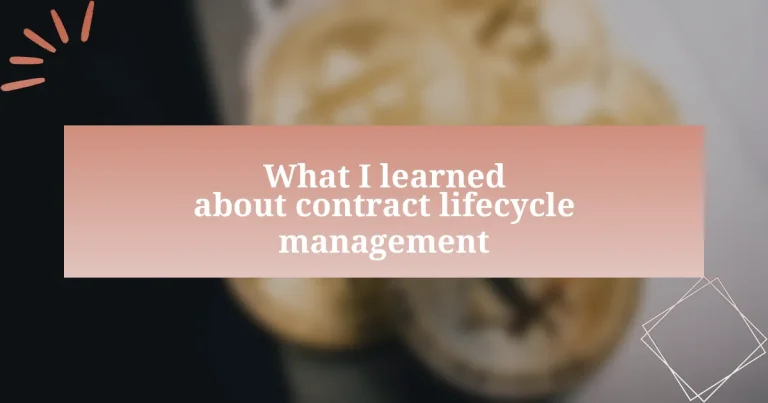Key takeaways:
- Contract lifecycle management (CLM) is essential for effective contract oversight, reducing risks, and enhancing operational efficiency through proactive management.
- The rise of decentralized finance (DeFi) empowers individuals by eliminating intermediaries, enhancing accessibility and transparency in financial transactions.
- Best practices for managing contracts in DeFi include maintaining clear documentation, regular reviews and updates, and engaging in continuous education about contract management tools.
Author: Evelyn Hartley
Bio: Evelyn Hartley is an award-winning author known for her engaging novels that blend intricate character development with compelling narratives. With a background in psychology, she skillfully explores the complexities of human relationships and the nuances of emotional journeys in her work. Evelyn’s books have been translated into multiple languages and have garnered acclaim from both critics and readers alike. When she’s not writing, she enjoys exploring the great outdoors and volunteering at her local animal shelter. Evelyn resides in the Pacific Northwest with her two beloved dogs and a steadily growing library.
What is contract lifecycle management
Contract lifecycle management (CLM) is the process of managing contracts from initiation through execution, performance, and eventual termination. It involves a series of crucial steps, including drafting, negotiating, reviewing, and monitoring contracts to ensure compliance and effectiveness. Have you ever thought about how often contracts are overlooked until something goes wrong? I’ve certainly found that being proactive can save a lot of headaches down the line.
In my experience, CLM goes beyond mere documentation; it’s about fostering strong relationships and transparency among all parties involved. For instance, when I was involved in a startup, ensuring that our partnership agreements were carefully managed helped us avoid conflicts and misunderstandings, ultimately leading to a smoother collaboration. Wouldn’t it be great if everyone took that approach?
Effective contract lifecycle management also entails utilizing technology to streamline this process. In a world driven by Decentralized Finance, implementing tools that automate contract tracking can drastically reduce errors and enhance efficiency. Remembering the manual tracking methods I once used, I can confidently say that modern solutions bring not just convenience but a newfound peace of mind.
Importance of contract lifecycle management
Effective contract lifecycle management is crucial for minimizing risks and enhancing operational efficiency. I’ve learned firsthand that when contracts are managed properly, it can prevent costly disputes that often arise from misunderstandings or oversights. The clarity that comes from thorough documentation and communication creates a foundation of trust—something that I’ve seen lead to long-lasting partnerships in my previous projects.
During my time working on a decentralized finance initiative, I realized the significance of timely renewals and compliance checks. I remember one instance where a missed contract renewal almost derailed a critical project. It sparked a sense of urgency in our team to prioritize CLM and keep track of key milestones diligently. How often do we truly appreciate the value of foresight until we’re on the brink of a setback?
Moreover, adapting to the rapid changes in the decentralized finance space necessitates agile contract management. I’ve witnessed how organizations that embrace flexible contracts are better equipped to pivot and seize new opportunities. It’s not just about contracts; it’s about being smart and responsive in an ever-evolving landscape. Why settle for reactive management when proactive strategies can empower teams to thrive?
Overview of decentralized finance
Decentralized finance, often referred to as DeFi, transforms the way we view financial services by utilizing blockchain technology to eliminate intermediaries. In my experience, this shift empowers individuals, granting them greater control over their assets and transactions. I’ve often marveled at how a simple smart contract can facilitate complex transactions without the need for traditional banking processes.
One of the most intriguing aspects of DeFi is its accessibility. Anyone with an internet connection can participate, breaking down barriers that have long existed in the traditional finance landscape. I recall the excitement I felt when I introduced a friend to DeFi platforms; the realization that they could lend, borrow, and trade without cumbersome applications was eye-opening for both of us. Have you ever experienced that sense of empowerment that comes from knowing you can engage in financial activities without gatekeepers?
In addition to accessibility, the transparency inherent in DeFi is striking. Every transaction is recorded on the blockchain, allowing participants to verify and audit activities in real-time. I often find myself reflecting on how this level of transparency fosters trust—something we desperately need in financial systems. Is it possible that through DeFi, we can create a more equitable financial future? The possibilities are endless, and that’s what makes exploring this space so thrilling.
Best practices for managing contracts
When it comes to managing contracts in DeFi, maintaining clear documentation is paramount. I’ve learned firsthand that having a centralized repository for all contract details allows for easier review and ensures compliance. This approach also minimizes the risk of disputes, which can be costly and time-consuming. Have you ever faced confusion about a contract’s terms because the information was spread out? I certainly have, and that experience taught me the value of organization.
Another critical practice is the regular review and update of contracts. I remember working with a team on a project where we neglected this aspect, and outdated terms led to operational inefficiencies. It’s essential to stay proactive, ensuring that all contract language reflects the current regulations and needs of the stakeholders involved. This diligence can prevent misunderstandings and build stronger partnerships. How often do you revisit your agreements to ensure they remain relevant?
Engaging in continuous education around contract management tools can also enhance your practice. I discovered that investing time in learning about smart contract auditing tools significantly improved my confidence in the technology. By making yourself familiar with these resources, you can better navigate the complexities of contract management. What tools or platforms have you found helpful in your own contractual dealings?

